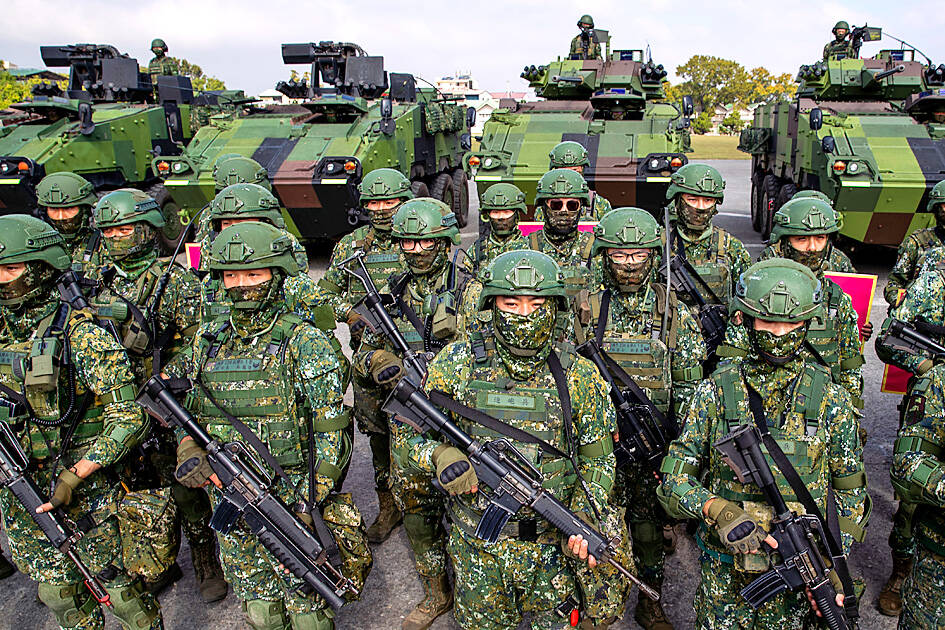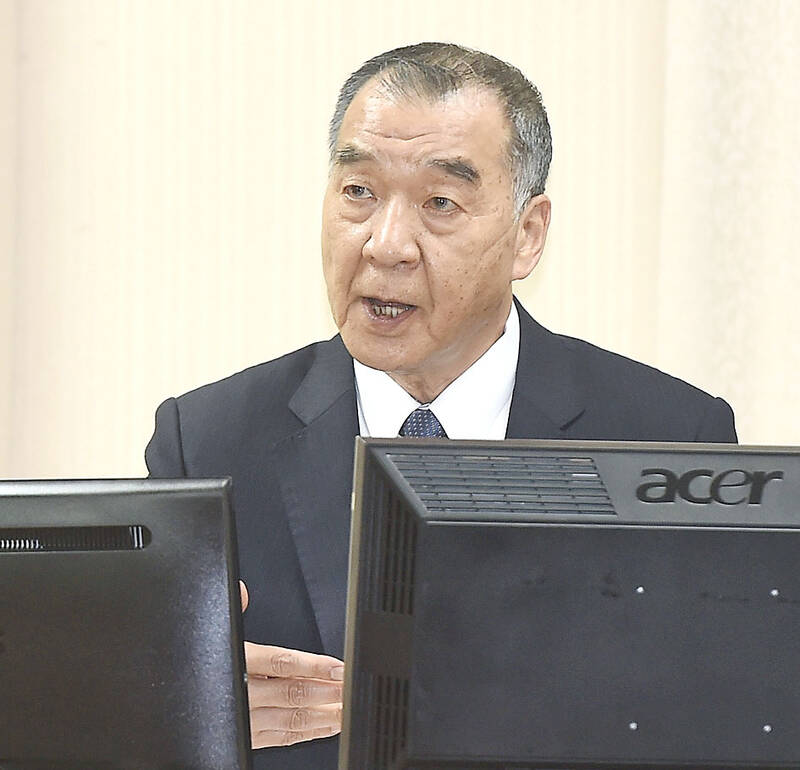Taiwan could survive a Chinese military assault unaided for two weeks if sufficient reserves were prepared for its defense, Minister of National Defense Chiu Kuo-cheng (邱國正) said.
“There is no need to debate whether the Chinese military is stronger and larger than Taiwan’s. Although it is big enough to start a war, it is not capable of defeating Taiwan in two weeks,” Chiu told the Chinese-language CommonWealth Magazine in an interview published on Tuesday.
“Even if China wins, it will be unable to impose autocratic rule in a year, two years or even more than that, because Taiwanese are free people and will not tolerate being governed by a one-party state,” Chiu said.

Photo: RITCHIE B. TONGO, EPA
When asked what lessons Taiwan can learn from the Russian invasion of Ukraine, Chiu said that ongoing conflict underscored the importance of maintaining preparedness at peacetime.
Unlike the Russian invasion of Ukraine, which is being waged in distinct battle zones, Taiwan would in a conflict become a continuous theater of operations without clearly defined front lines or rear areas. Chiu added.
“Chinese aircraft carriers would likely be deployed in the seas to Taiwan’s east, not so much to launch attacks against Taiwan from the east coast, but to block other forces from intervening,” he said.

Photo: Chien Jung-feng, Taipei Times
Although China is more likely to deploy its aircraft carriers as a blocking force in the seas east of Taiwan, a naval threat on the east coast cannot be entirely discounted, which means the nation must not depend solely on the supply depots in the region to survive a blockade, he said.
“[Taiwan] absolutely can outlast a blockade given that we prepare sufficient materiel, and that communications with the outside world are maintained via the myriad means available to us, including the Internet and telecommunications technology,” he said.
Regarding asymmetric warfare, Chiu said the military should procure light defensive weapons that provide the capability to defeat tanks, airplanes and ships for their deterrence value.
These capabilities should form only a part of the arsenal of the nation’s armed forces, while the air, sea and land forces’ ability to operate heavy weapons and large units remain essential to defense, he said.
When asked about the increase of military exchanges from other countries, Chiu said the rise in Chinese activities in the economic, trade and technological domains has alarmed other nations and incentivized them to gain more understanding of Beijing through ties with Taiwan.
“We are simultaneously conducting exchanges with other countries to gain information from their participation in international organizations,” he said, adding that “we seek to cooperate in mutually beneficial ways with countries that can help defend Taiwan whenever the opportunity arise.”
“I have been in the military for close to forty or fifty years. I am against war … war can only end in grim victories and defeats,” he said. “War is the continuation of politics through other means, which represents failure of politics. We seek to strengthen our defense, not provoke war by giving China excuses.”

Alain Robert, known as the "French Spider-Man," praised Alex Honnold as exceptionally well-prepared after the US climber completed a free solo ascent of Taipei 101 yesterday. Robert said Honnold's ascent of the 508m-tall skyscraper in just more than one-and-a-half hours without using safety ropes or equipment was a remarkable achievement. "This is my life," he said in an interview conducted in French, adding that he liked the feeling of being "on the edge of danger." The 63-year-old Frenchman climbed Taipei 101 using ropes in December 2004, taking about four hours to reach the top. On a one-to-10 scale of difficulty, Robert said Taipei 101

A preclearance service to facilitate entry for people traveling to select airports in Japan would be available from Thursday next week to Feb. 25 at Taiwan Taoyuan International Airport, Taoyuan International Airport Corp (TIAC) said on Tuesday. The service was first made available to Taiwanese travelers throughout the winter vacation of 2024 and during the Lunar New Year holiday. In addition to flights to the Japanese cities of Hakodate, Asahikawa, Akita, Sendai, Niigata, Okayama, Takamatsu, Kumamoto and Kagoshima, the service would be available to travelers to Kobe and Oita. The service can be accessed by passengers of 15 flight routes operated by

Taiwanese and US defense groups are collaborating to introduce deployable, semi-autonomous manufacturing systems for drones and components in a boost to the nation’s supply chain resilience. Taiwan’s G-Tech Optroelectronics Corp subsidiary GTOC and the US’ Aerkomm Inc on Friday announced an agreement with fellow US-based Firestorm Lab to adopt the latter’s xCell, a technology featuring 3D printers fitted in 6.1m container units. The systems enable aerial platforms and parts to be produced in high volumes from dispersed nodes capable of rapid redeployment, to minimize the risk of enemy strikes and to meet field requirements, they said. Firestorm chief technology officer Ian Muceus said

MORE FALL: An investigation into one of Xi’s key cronies, part of a broader ‘anti-corruption’ drive, indicates that he might have a deep distrust in the military, an expert said China’s latest military purge underscores systemic risks in its shift from collective leadership to sole rule under Chinese President Xi Jinping (習近平), and could disrupt its chain of command and military capabilities, a national security official said yesterday. If decisionmaking within the Chinese Communist Party has become “irrational” under one-man rule, the Taiwan Strait and the regional situation must be approached with extreme caution, given unforeseen risks, they added. The anonymous official made the remarks as China’s Central Military Commission Vice Chairman Zhang Youxia (張又俠) and Joint Staff Department Chief of Staff Liu Zhenli (劉振立) were reportedly being investigated for suspected “serious